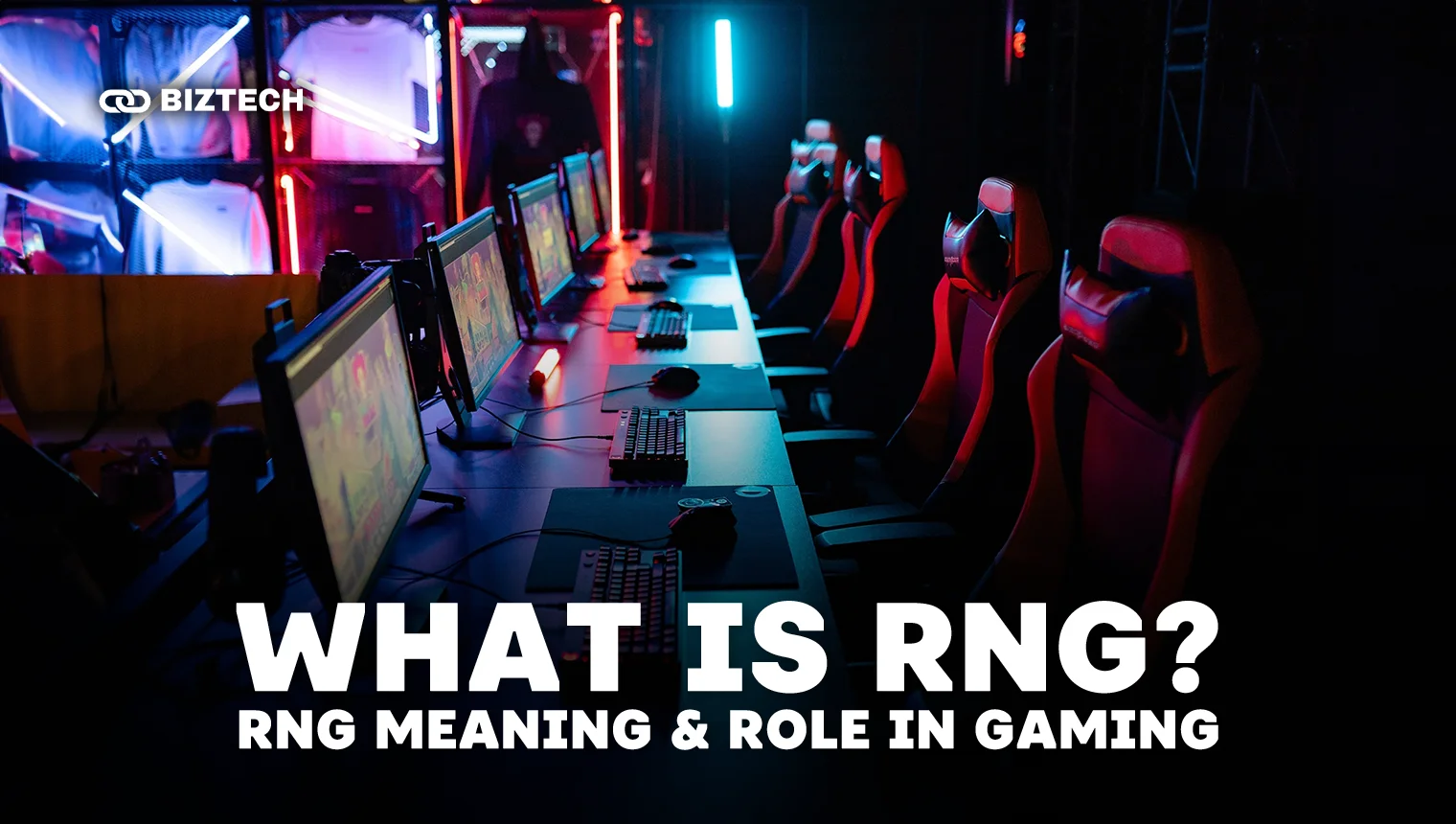Randomness adds an unpredictable edge that keeps games exciting. The element of surprise that emerges from random number generation (RNG) throws interesting challenges at players, spurring adaptable gameplay. The RNG ensures endless variety, replayability, and ever-changing experiences that hook gamers.
- What is a Random Number Generator (RNG)?
- How Does RNG Work in Gaming?
- The Mechanics Behind Random Number Generators
- The Impact of RNG on Game Design
- Balancing Skill and Luck: RNG’s Dual Role
- Popular Games and How They Utilize RNG
- Why Do Developers Use RNG?
- The Advanced Applications of RNG
- RNG in Competitive Gaming and Esports
- Beyond Gaming: RNG in Other Industries
- The Impact of RNG on Players
- Pros and Cons of RNG in Gaming
- RNG: The Debate on “Good” vs. “Bad”
- The Future of RNG: Balancing Luck with Strategy
Yet, RNG has a notorious reputation among some gamers for unleashing the fickle hand of fate that amplifies luck over skill. Love it or hate it, RNG has an unmistakable presence in modern games. This blog post will dive into the RNG phenomenon to uncover what it means for gameplay and game design.
Focusing on everything from RNG’s mechanics to its controversial status among players, we’ll get under the hood of random number generators.
Players can better strategize around its impacts by understanding the principles governing how RNG works, while developers can wield randomness as a feature to enhance their games.
What is a Random Number Generator (RNG)?
A random number generator (RNG) refers to any device or algorithm that can produce numbers, sequences of numbers, or other symbols that exhibit random characteristics. RNGs generate random and unpredictable outputs, lacking any discernible pattern for players to anticipate future results.
At their core, RNGs introduce randomness and chance into games. They function as virtual dice rolls, determining probabilistic outcomes that inject variability and uncertainty. RNGs may govern major in-game events like combat hits and loot drops or minor ambient details like environmental textures.
Modern games frequently incorporate software RNGs running complex mathematical algorithms. These pseudo-random number generators (PRNGs) can rapidly generate intricate sequences of seemingly random numbers founded on predefined inputs. While not truly random, PRNGs produce satisfactory results for most gaming applications.
Hardware-based true random number generators (TRNGs) also exist. They leverage physical processes like radiation decay to produce indisputably random values devoid of algorithms. However, PRNGs strike the right balance between genuine randomness and efficient game integration.
How Does RNG Work in Gaming?
Randomness adds excitement and suspense to games, but how exactly does RNG deliver unpredictable gameplay? This section breaks down the inner workings of random number generators and their integration across different games.
We’ll explore the algorithms powering RNG, how developers balance its impacts, and real-world examples of RNG mechanics.
The Mechanics Behind Random Number Generators
At their most basic level, RNGs generate numerical values that are effectively random for gaming purposes. Random number generation uses complex mathematical formulas and equations to produce randomized outputs.
Pseudo-random number generators (PRNGs) are the most common RNGs used in modern video games. PRNGs utilize algorithms that mathematically manipulate an initial numeric seed value to deliver seemingly random numbers. While not completely random, PRNGs generate sufficiently unpredictable sequences for most gaming needs.
The Impact of RNG on Game Design
RNG often plays a major role in game design. Randomness ensures endless variety and injects excitement via uncertain outcomes. RNG governs numerous gameplay elements, including combat calculations, procedural world generation, loot drops, critical hits, and more.
However, excessive RNG can undermine skill-based gameplay and player agency. Designers must strike the right balance, leveraging controlled randomness to increase replayability without overreliance on pure luck. Well-implemented RNG complements gameplay, while poorly balanced RNG disrupts it.
Balancing Skill and Luck: RNG’s Dual Role
RNG inhabits a delicate position between enhancing games through unpredictable variety and frustrating players by downplaying skill with excessive randomness. Designers must weigh RNG’s impacts on how players perceive their agency and mastery over game systems.
Deftly incorporating RNG means implementing enough randomness to spur adaptability and reward experimentation without completely negating player input. Different genres rely more heavily on skill versus luck, requiring tailored RNG integration.
Popular Games and How They Utilize RNG
Many genres leverage RNG mechanics as core features driving gameplay:
Roguelikes – Randomly generated maps/layouts, item spawns
MMORPGs – Loot drops, character stat growth, critical hit chance
CCGs – Shuffling card draw order
RPGs – Percentage chance attacks hit targets, stat variability
FPS – Bullet spread patterns, recoil handling
Why Do Developers Use RNG?
RNG brings key benefits spanning gameplay variety, replayability, surprise elements, and challenge customization. Procedural generation via RNG algorithms enables new experiences in every playthrough that entice players to return.
RNG mechanics also grant developers more control to calibrate game difficulty and progression pacing. Tweaking RNG significance behind the scenes helps strike the ideal balance between skill testing and fun randomness.
Additionally, crafting endless variations manually would prove unfeasible for developers, making RNG’s automated randomness generation highly practical. Overall, RNG delivers dynamic and easy-to-configure gameplay that augments replay value.
The Advanced Applications of RNG
While randomness has become a standard component of many game genres, RNG also serves specialized purposes at high-level competitive gaming and beyond the gaming space. This section explores some advanced use cases using sophisticated random number generation.
RNG in Competitive Gaming and Esports
RNG permeates competitive gaming in calculated ways to increase excitement without overly benefiting lesser players with luck alone. For example, battle arena games leverage small degrees of randomness governing minor mechanics like short-range weapon sprays.
Critical hits in multiplayer online battle arena (MOBA) titles constitute another RNG element that provides bursts of damage requiring tactical decision-making. Implemented judiciously, controlled randomness heightens risk-reward considerations and audience entertainment value.
However, excessive randomness undermines competitiveness, as unpredictable outcomes mean superior skill and strategy can still lose due to bad luck. Minimizing extreme unpredictability preserves integrity in high-level play while allowing some variability.
Beyond Gaming: RNG in Other Industries
Gaming constituted RNG’s earliest and widest adoption, but major applications now abound in other fields. Cryptography and cybersecurity leverage hardware-based quantum randomness for ultra-secure communication encryption. Statistical sampling integrates RNG to select neutral data set representatives.
Major modern use cases include:
• Cryptography: Unbreakable high-security key generation
• Computer simulations: Credible digital experiment modelling
• Mathematics: Complex numerical analysis techniques
• Casino/gambling Industry: Electronic slot machines, roulette, card shuffling
As computing evolves, RNG assimilation continues expanding across the finance and resource management sectors as handling unpredictability becomes more crucial.
The Impact of RNG on Players
RNG elicits a polarizing range of reactions from players. While randomness enhances enjoyment for some by varying gameplay, others condemn over-reliance on luck over skill. This section weighs the pros and cons of RNG for gaming experiences.
Pros and Cons of RNG in Gaming
RNG is a double-edged sword, providing unique benefits and drawbacks.
Pros:
- Increased excitement and unpredictability: RNG spikes thrill through unexpected developments, keeping players on their toes.
- Boosted replay value: Randomized elements such as maps and loot items entice continued playthroughs to experience new variations.
- Custom difficulty: Luck-based mechanics allow self-imposed challenge calibration to match player skill levels.
Cons:
- Reduced influence of player skill: Overbearing RNG minimizes gameplay impacts of tactical mastery and practice in favor of pure chance.
- Frustration over perceived unfairness: Random elements sometimes create no-win scenarios or disproportionate setbacks players view as arbitrarily punitive.
- Reduced sense of control/agency: Domineering RNG strips away player capacity to affect outcomes through informed decision-making by emphasizing arbitrary luck.
- Some RNG Can Be Manipulated: While not condoned in competitive environments, savvy players can exploit RNG algorithms in many single-player games for favourable odds by reverse-engineering formulas and understanding their limitations. However, the potential for manipulation depends on the complexity and methods governing a game’s RNG, with simple systems using fixed seeds being more predictable than sophisticated algorithms.
RNG: The Debate on “Good” vs. “Bad”
Is RNG a valuable tool for enhancing gameplay or a destructive force that undermines player skill and agency? This question lies at the heart of an ongoing debate within the gaming community.
On one side, RNG advocates argue that randomness is essential for keeping games fresh and engaging. They believe that the unpredictability introduced by RNG prevents games from becoming stale and repetitive. They contend that players would quickly lose interest without chance once they’ve mastered a game’s mechanics.
Furthermore, supporters argue that RNG creates exciting moments of surprise and delight. The rush of successfully overcoming an unlikely challenge or receiving an unexpectedly powerful reward can be incredibly satisfying for players.
Conversely, RNG detractors assert that relying too heavily on randomness robs players of their sense of control and accomplishment. They argue that true mastery should result from skill and dedication, not luck. When RNG dictates progress, players may feel that their efforts are meaningless.
Moreover, critics claim that excessive RNG leads to frustration and disengagement. Constantly being at the mercy of chance can make players feel powerless, leading to helplessness and apathy.
So, is RNG good or bad for gaming? It’s a complex issue with no easy answers. Like any tool, RNG can be used effectively or misused. The key lies in finding the right balance and ensuring that randomness enhances rather than overtakes the gameplay experience.
| Good | Bad |
| Controlled randomness expands the possibilities | Excessive randomness restricting control |
| Sporadic, unexpected developments keep gameplay fresh | Frequent unilateral reversals negating player input |
| Encourages adaptive thinking and reacting | Forces frustrating restarts and repetition |
| Influences outcomes without fully determining them | Dominates outcomes despite player actions |
The Future of RNG: Balancing Luck with Strategy
As gaming evolves, RNG (Random Number Generator) will remain crucial, driving replayability and personalized experiences. However, developers must find the sweet spot between skill-based challenges and engaging randomness. Transparency in RNG mechanics and player agency are essential.
Advanced RNG algorithms in future games promise procedurally generated content and unique adventures. By calibrating randomness strategically, games will offer dynamic and endlessly enjoyable experiences.
Despite current concerns about excessive randomness, developers are constantly refining controlled RNG implementation to prioritize enjoyment. We can expect advanced algorithms and calibrated game design to harness randomness as a strategic asset in the coming years.








